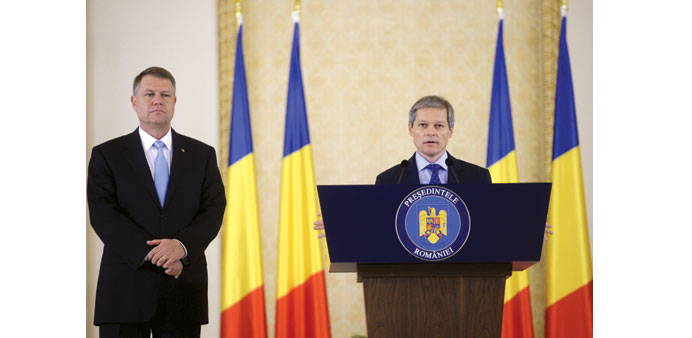Ciolos speaks after being appointed as prime minister by Romania’s centrist President Iohannis.
Reuters
Bucharest
Romanian President Klaus Iohannis named former European commissioner Dacian Ciolos, a technocrat, to head a broad-backed government to replace that of leftist Victor Ponta who quit last week amid public anger over a deadly nightclub fire.
Ciolos, 46, who was picked by European Commission President Jean-Claude Juncker in July as his special adviser on food security, will easily garner parliament support in a confidence vote likely at the end of this month, analysts said.
“I see a government of technocrats as the solution for now,” Iohannis told reporters. “Political parties agree with this idea. I’m convinced this is the right path for a year (until a parliament election).”
Ponta unexpectedly quit on November 4 after tens of thousands, mostly young people, took to the streets to protest high-level sleaze following the fire in a Bucharest night club.
He now faces charges of forgery and money laundering.
Forty-eight people have died and scores of others have been left seriously hurt from the October 30 disaster at a rock concert.
The biggest party, the Social Democrats (PSD) had been the only grouping that had made a nomination – though they had proposed deputy central bank governor Liviu Voinea to take over, suggesting a split in their coalition.
Other parties stopped short of proposing a premier.
The centrist Liberal opposition, a former Ponta junior ally, and ethnic minority groupings, including the Hungarians UDMR Party, which have a combined majority in parliament without the PSD, have said they will back any Iohannis proposal.
Under the constitution, Ciolos has 10 days to draft a programme, come up with a team of ministers and ask parliament for a vote of confidence.
“We’ve been through a key period for our society. Romanian society has reached that degree of maturity that requires a public presence by a government, so that it acts like a bridge between various state institutions,” Ciolos told a news conference.
“He (Ciolos) will likely try to select independent candidates to head individual portfolios. His government will not make any significant changes in current policies. It will be a cabinet of ‘status quo maintenance’”, said Otilia Dhand, an analyst at Teneo Intelligence, a New York-based political risk consultancy.
Commentator Mircea Marian said a technocrat cabinet with the term ending in late 2016 will easily pass parliament.
Regular parliament elections are scheduled for December 2016.

